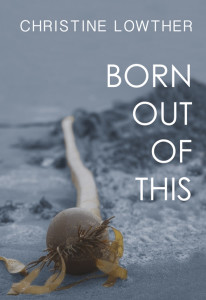 Review by Wendy Bone
Review by Wendy Bone
Born Out of This
Christine Lowther
Caitlin Press, 2014
“I’ve been stamped both ‘nature girl’ and punk rocker,” writes Christine Lowther in her memoir, Born Out of This. “Like other writers, I’m industrious and rebellious, distracted and productive, damaged and healing, all with my bruised butterfly heart.” (186)
In this collection of essays that make up her life story, Lowther proves that being a punk rocker, poet and nature lover isn’t as contradictory as one might think. At age ten, she endured the worst that life could throw at her, from the violent loss of her mother, the poet Pat Lowther, at the hands of her father in 1975, to being bounced around foster care homes and her ailing grandmother’s house.
While the experience of growing up without either parent would understandably do irreparable damage to a young psyche, Lowther found a way to channel her pain in the poetry of teen angst, later finding expression and redemption in the punk rock movement and, ultimately, in the natural world surrounding her float home near Tofino, British Columbia.
Lowther wisely tackles her family history with a condensed version of her childhood years in the second chapter, “Gifts From Lands So Far Apart”. As the daughter of one of Canada’s great poets, this part of her life has already been covered elsewhere in some depth, including in her first book of poems, New Power, in 1999. She doesn’t dwell on the particulars but does reveal enough to show that her mother’s life, poetry and environmental activism naturally inform her own.
Remarkably, Christine writes without a hint of self-pity or sentimentality. She’s burnt that journal from her teen years, and as an adult looks to the natural cycles of life and death to help make sense of her profound loss. An infant harbour seal cries for its mother on the rocks near a neighbour’s oyster farm. A dead hawk in the woods causes her to consider what she might be able to salvage. A cougar encounter forces her to face her own mortality.
Through her writer’s lens, Lowther transforms her wild encounters into opportunities for healing and strength. She learns that the seal is not abandoned but waiting while its mother has gone in search of food. A feather from the hawk becomes the centrepiece of a dreamcatcher through which she spots a mother bear and her cub. The cougar says, “meow” and wanders away, leaving Lowther to wonder:
Now all I hunt is the peace
that is lost to me,
and I cannot blame you
who offered yourself—
innocence, might, and grace—
to something unbelievably fragile, tame. (53)
Nature isn’t always so benign, however. Blending her poetic sensibilities and interest in biology, she also writes of killer pink sea stars, moon snails that drill holes in sand dollars, and otters lustily crunching crabs. But the encroachment of human civilization is the worst threat of all. In “Loving Eik”, one of her most powerful essays, Lowther successfully fights back with a group of like-minded protestors when the continued gentrification of Tofino threatens the existence of Eik, an ancient red cedar.
This is where Lowther’s “inner punk” comes into play. Her mother may have inspired her activism but it continues to be nurtured by the punk rock community and its message of rebellion against injustice. Her essays move from the meditative, natural world of the first section, “Floating Season”, to the world of punk rock and protest in the much shorter “Asphalt Season”. In “Generally Giving a Damn”, she writes of the pivotal moment when, in grade twelve, she saw Vancouver punk band D.O.A. singing “Fucked up Ronnie” in protest against the politics of then-US president Ronald Reagan. Punk was the perfect outlet for her rage at the violence against her mother and at the nuclear arms race that threatened to destroy the planet: “I was drawn to the political consciousness, the freedom to express anger and demand justice; the ecstasy; the trust when leaping from a stage; the insistent questioning and remaking.” (143)
While her punk years take up less space in the book, they provide a fascinating glimpse into Lowther’s growth as an activist and artist. The last story in “Asphalt Season”, called “Gibson Street Fireweed”, is perhaps the most punk of all. She recounts an unpaved section of road in Tofino where a patch of fireweed blooms. She noticed one plant was injured and did not grow straight but rather “branched out and flowered more profusely than all the unbroken ones. Every branch aflame.” (155)
In the final section, “Merge”, also quite short, Lowther brings these opposing aspects of soft and hard together in her mediations on art and activism. Overall, the writings have a scrapbook feel, as if from one of the zines she created in her youth, with photos, illustrations (a D.O.A. sign that urges “participation not decimation”), lines from her mother’s and her own poetry and quotes from influential artists such as Marilyn Bowering and Bruce Cockburn. Still, it’s a cohesive paean to nature combined with a punk rock anger at its decimation that makes sense in light of that resilient anarchy of fireweed: “The blooms may not have been focussed but they were everywhere, crooked and sweet. A dazzling compensation.”
Wendy Bone writes from her home next to a rice paddy in West Java, Indonesia. She has published articles in Pacific Yachting and Alive Magazine, poetry in Room and short stories in The Jakarta Post. She is taking her Masters in Creative Writing online at UBC.